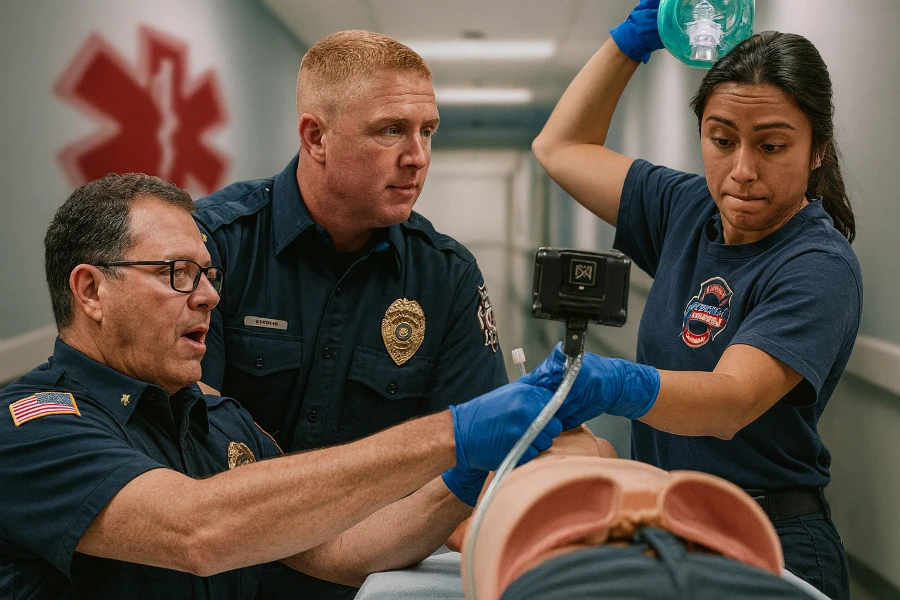Key Takeaways
• You should assess your behavioral, emotional, and practical readiness before pursuing promotion or paramedic school.
• Florida-specific paramedic programs demand EMT and CPR credentials, academic prerequisites, and clearance through health and legal screenings.
• Structured preparation—spanning study routines, soft-skill development, and real-world experience—sets you up for long-term success.Understanding the Drive for Advancement
The Psychology Behind Career Growth
Career growth often starts with a simple question: what’s next for me? Many professionals experience a deep internal urge to do more, lead more, and know more. This sense of progression emerges from both self-fulfillment and the desire to serve communities more effectively. Research shows that personal development contributes to higher job satisfaction and lower burnout in emergency services. Understanding this internal motivation can guide EMTs and first responders toward thoughtful career decisions.
Why This Decision Matters in EMS
Emergency medical services rely on individuals who seek excellence in unpredictable, high-stakes situations. As the profession evolves, so do the demands placed on EMS providers. Deciding to pursue a promotion or paramedic certification directly impacts public safety and operational efficiency. Leadership roles influence team dynamics, while paramedics handle more complex cases. Choosing the right path strengthens the system and enhances patient outcomes.
Recognizing the Signs: Are You Truly Ready?
Key Behavioral Indicators of Readiness
Stepping into a higher role requires more than ambition. Readiness often shows in consistent task execution without external supervision. You might already mentor colleagues or solve issues others avoid. If peers seek your advice or copy your work habits, you are likely leading without a title. Taking initiative and showing resilience under pressure are signals you’re prepared for the next level. These qualities distinguish future leaders from those still learning the ropes.
Emotional and Mental Readiness
Promotions and schooling come with mental demands that challenge even seasoned professionals. You may feel eager to stretch your limits without fearing failure. Emotional readiness shows in your ability to stay calm in chaos and bounce back from difficult calls. Being open to critique and genuinely hungry for feedback signals maturity. If you’re reading job listings or course outlines with interest instead of dread, you are likely mentally prepared. Trust in your potential must accompany any career leap.
The Promotion Track: Advancing from Within
Understanding Internal Promotion Standards
Each agency defines promotion requirements differently, but core traits remain consistent. Leadership potential, accountability, and consistent performance carry weight. Field training officer (FTO) roles often act as the first step toward structured leadership. Higher ranks like lieutenant or captain demand knowledge of logistics, people management, and operations. Agencies may also assess how well you embody the organization’s mission and values. Excelling in your current role lays the groundwork for upward mobility.
Building a Promotion-Ready Profile
To increase your chances of promotion, document every leadership task you’ve handled. Keep records of certifications, incident reports, and peer commendations. Step up during shifts when things go sideways, and don’t wait to be asked. Seek out professional development opportunities even if they fall outside your shift schedule. Develop emotional intelligence, resolve conflicts professionally, and build rapport with your team. These actions create a promotion-ready image that leadership recognizes.
The Paramedic School Track: What It Really Demands
Core Prerequisites for Florida-Based Paramedic Programs
Florida paramedic training programs follow structured admission requirements designed to ensure candidate success. You need a valid Florida EMT certification and CPR certification before enrollment. Most institutions require college-level Anatomy and Physiology with a lab component. Programs often ask for proof of a high school diploma or GED. Students also undergo background checks, health screenings, and must be at least 18 years old. Some schools also require current BLS for healthcare providers certification to demonstrate emergency readiness.
Navigating Program-Specific Entry Barriers
Some programs enforce additional filters such as entrance interviews, GPA minimums, or limited-access admissions. Colleges may prioritize applicants with prior clinical experience or coursework in English and Algebra. Accredited programs demand adherence to rigorous quality standards, such as CAAHEP or CoAEMSP. These credentials influence eligibility for certification exams after graduation. Understanding your chosen school’s specific criteria gives you a strategic advantage during the application process.
What to Expect Once You’re In
Academic Demands in Paramedic School
Students can expect intense weekly schedules that blend classroom learning with practical application. Courses like cardiology, pharmacology, trauma care, and airway management require full attention. Programs often include 16+ hours of lectures, 6 hours of homework, and up to 36 hours of clinical practice weekly. Instructors expect you to keep pace and participate actively in labs and simulations. Falling behind academically can impact your clinical eligibility and program standing. Students planning to work in cardiac care should consider pursuing ACLS certification to strengthen their understanding of emergency cardiovascular life support protocols.
Clinical and Field Internship Realities
Internships immerse students in real-time patient care across hospitals and EMS units. Every shift tests your ability to apply classroom knowledge in unpredictable settings. You must arrive on time, maintain professionalism, and communicate clearly with preceptors. Many programs set performance benchmarks such as minimum patient contacts and skill repetitions. Reflection and peer feedback enhance your learning during these rotations. Providers who work with pediatric cases should ensure their PALS renewal remains current to stay updated on life-saving interventions and cardiac rhythm protocols in children.
3 Practical Tips to Help You Prepare Now
- Set up a study routine that mimics paramedic school pacing.
- Allocate time for didactic review, quizzes, and case-based scenarios weekly.
- Seek out a ride-along or informational interview with a current paramedic to get unfiltered insights.
Refresh your knowledge in anatomy, physiology, and drug calculations using free or low-cost online tools. Preparation builds confidence and lowers the risk of burnout once school starts.
Common Mistakes That Stall Career Progression
Misreading the Timing
Some EMTs rush into promotions or schooling without mastering their current duties. Taking the leap too early often leads to overwhelm or failure. Others delay for years, missing growth windows due to fear or lack of direction. Finding the right timing depends on your emotional readiness and performance history. Track your progress and solicit feedback to gauge when you’re truly ready. One year of field experience is often considered a strong baseline for entry readiness.
Failing to Prepare Holistically
Career advancement requires more than ticking off eligibility boxes. Ignoring personal growth areas like communication, leadership, or stress management leads to setbacks. A strong academic record won’t compensate for poor interpersonal skills in clinical rotations. Candidates who underestimate mental and emotional strain often burn out mid-program. Taking a holistic approach ensures you’re not only eligible but equipped to thrive. Balanced preparation sets the stage for long-term success.
How to Choose the Right Path Forward
When Promotion Is the Right Move
If you thrive in your current agency and want to influence daily operations, consider promotion. You already understand your team’s dynamics and can mentor from within. Advancing internally offers financial stability and familiar work conditions. Your leadership can help shape protocols and morale across shifts. Leadership development in EMS remains a growing need, and internal promotion helps address it.
When Paramedic School Is the Smarter Step
Pursue paramedic training if you’re eager to expand clinical capabilities and handle higher-acuity calls. This move suits EMTs who want more autonomy and skill variety in patient care. Entry into specialized fields like critical care transport or flight medicine starts with paramedic licensure. Additional credentials enhance your competitiveness in both public and private sectors. School provides a launching pad for broader professional opportunities.
FAQs: Readiness and Next Steps
What’s the ideal amount of EMT experience before applying to paramedic school?
Most schools recommend 6 to 12 months of field experience before enrolling. This timeline allows you to build practical skills and emotional resilience.
How do I know if I’m better suited for leadership or clinical advancement?
If you enjoy mentoring peers and optimizing workflow, consider leadership. If complex patient care excites you, explore paramedic school.
Can I pursue paramedic school while working full-time as an EMT?
It’s possible but extremely challenging. Many students reduce work hours or shift to part-time roles during school.
What if I don’t meet all the academic prerequisites yet?
Take required courses at community colleges or online platforms. Planning early helps prevent delays in application eligibility.
Crafting a Personalized Roadmap for Growth
Career growth is rarely linear, especially in high-stakes professions like EMS. Start by evaluating what drives your desire for advancement and where you see yourself long-term. Talk to trusted mentors who can offer perspective without bias. Once you choose a path, outline steps and commit to timelines. Regular self-check-ins ensure you stay aligned with your goals. Nearly one in three paramedic students fail to complete certification, so planning ahead truly matters.

Jeromy VanderMeulen is a seasoned fire service leader with over two decades of experience in emergency response, training, and public safety management. He currently serves as Battalion Chief at the Lehigh Acres Fire Control & Rescue District and is CEO of the Ricky Rescue Training Academy, a premier provider of online and blended EMT and firefighter certification programs in Florida.
Jeromy holds multiple degrees from Edison State College and the Community College of the Air Force, and is pursuing his MBA at Barry University. He maintains top-tier certifications, including Fire Officer IV, Fire Instructor III, and Fire Inspector II, and has served as a subject matter expert for a court case. He is a member or the Florida Fire Chiefs Association.
Jeromy also contributes to state-level fire safety regulation and serves on several hiring and promotional boards.

